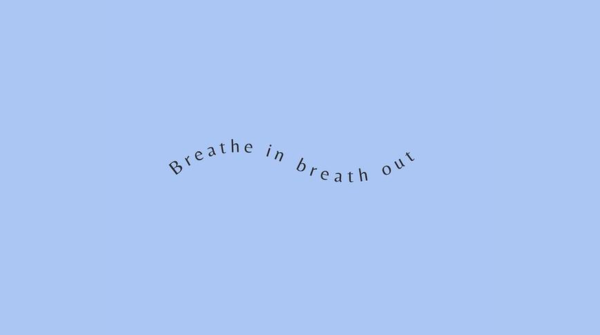Breathe Less.

I feel my back pressed against the chair and the warmth of my feet on the hardwood floor. I focus on the slow rise and fall of my belly, controlling the movement of my diaphragm. Up... and down... I start to feel a slight sensation of air hunger but continue to inhale slowly and deliberately.
I’m measuring my respiratory rate, which is a fancy way of saying I’m counting my breath cycles per minute. One inhale + one exhale = one breath cycle.
When I breathe normally, without slowing down my breath, I’m at 15 cycles per minute. That makes me a pretty average breather, since most adults are at 12-18 breath cycles. These numbers probably don’t mean much until you know that the “ideal” and most efficient way of breathing is only 5.5 breath cycles per minute.
Yikes. I, along with my fellow average breathers, have a long way to go.
As modern humans, we breathe too fast and too much. There’s a direct relationship between our respiratory rate and the state of our nervous system and thus our physiological and mental health.
Intuitively, my thought here was: how can that be? The more I breathe, the more oxygen I have in my system. That can’t be a bad thing, right?
Read on, my over-oxygenated friends. This stuff is fascinating.
Too much in
The air you inhale has about 21% oxygen. The air you exhale has about 15-18% oxygen (depending on your metabolism.)
A quick mental calculation I assume we can all do, tells us we’re not using most of the oxygen we inhale. Huh? Why?
A healthy person usually has an oxygen saturation level between 95-99%, meaning they have more than enough oxygen in their bloodstream. The reason we keep inhaling so much oxygen, even though we don’t need it, is a result of our modern lifestyle. (Of course, always the same culprit.) Factors such as time urgency, tension, anger, stress, anxiety, overeating, sedentary lifestyles, processed foods, a belief that taking big breaths is good, lack of exercise, excessive talking, high temperatures within the home—these all contribute to our habit of overbreathing.
For one, this is wildly inefficient for a system that thrives on efficiency.
But wait, there’s more. Breathing isn’t just about inhaling. Every unnecessary inhale is followed by an unnecessary…
Too much out
Exhale! Well done, you know your stuff.
But did you also know that with every out-breath, you’re removing carbon dioxide (CO2) from your system? And that CO2 is not just a waste product?
It’s actually the key that unlocks oxygen from your blood to be used by your brain, heart, and other tissues.
When you expel too much CO2 through excessive exhalation, oxygen is not delivered to your cells in an efficient way.
Especially for the brain, you can imagine this is problematic. At rest, that 3-pound electrified pâté is the most energy-consuming organ in your body. When there's a lack of oxygen, even for a short period, it can impair brain function. The brain becomes hyper-excitable, causing anxiety and making it difficult to focus and make decisions.
Practice slow, deep breathing
So the main takeaway here is:
There’s value in learning how to breathe slower. There’s a number of positive benefits but a key one is that this will balance the oxygen and O2 levels in your body, leading to efficient oxygenation of your tissues.
I know that sounds intangible, but just imagine your brain begging for oxygen.
Start by taking stock of your respiratory rate. Set a timer for 1 minute, and count your breath cycles. For now, don’t change anything about your breath. Breathe how you normally would.
Then spend some time, 2-3 minutes per day, practicing slow, deep breathing. You can do that while sitting down to read, while working, while making coffee.
Some quick tips:
- Focus on breathing through your nose. This offers more resistance than breathing through your mouth, which helps you exhale slower.
- Take small pauses between inhales and exhales.
- Control the diaphragm, like I was doing in the intro. One way to do that is to deliberately expand your stomach “out” when inhaling and let it return “in” while exhaling.
Member discussion